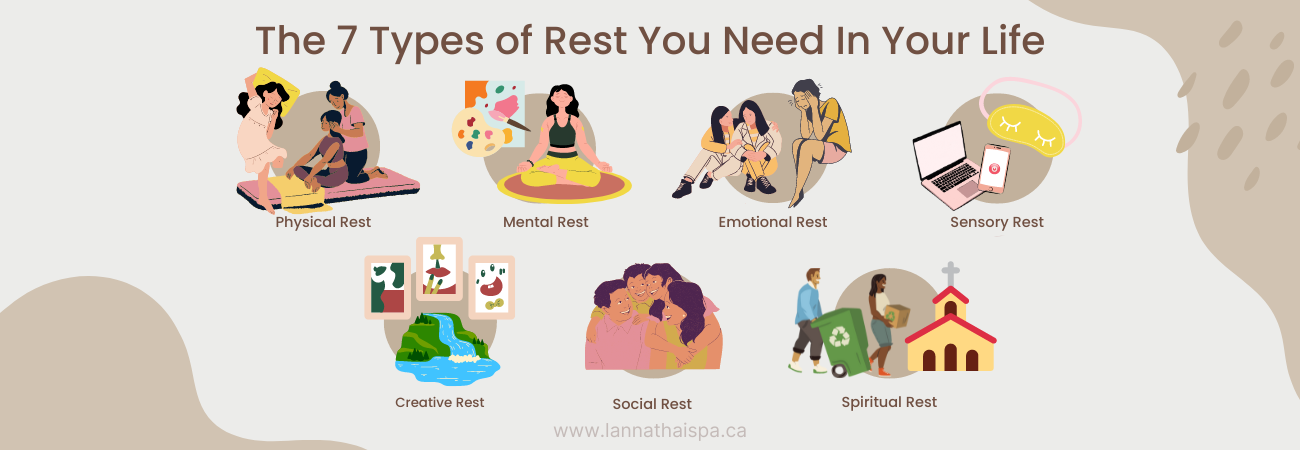Photo Credits to www.willowrundental.net
Did you know that there are actually many types of rest that we should incorporate into our daily lives for overall health? If you’ve experienced feeling so tired that you catch up on sleep, only to wake up still feeling exhausted. It’s because sleep and rest are two different things, and many confuse the two.
We go through our days thinking that we’re getting rest if we’re getting sufficient sleep, but the truth is that we are missing out on the other types of rest that we need as much. Failing to cover these areas result in chronic stress and burnout.
Learning about and then incorporating the different forms of rest can impact your overall well-being positively and you’ll feel more mentally sharp, emotionally balanced, relaxed, and energized.
Types Of Rest For Better Health
Each type of rest plays an essential role in your overall health. Rest should equal restoration in seven key areas of your life, which are the following:

Physical Rest
This is probably what everyone is most familiar with. Physical rest, which can be passive or active, is important for recharging the body and maintaining energy levels.
Napping and sleeping are passive forms of physical rest, which also includes activities like lying down, relaxing your muscles, and engaging in gentle movement. On the other hand, active physical rest means massage therapy, stretching, yoga, and other restorative activities.
Together, they can make you feel fully rested physically, as they help rest tired muscles, release tension, improve flexibility, and help your body recover from the physical demands of daily life.
Get a good, relaxing massage regularly to help you achieve physical rest. Contact us today to schedule a session!
Mental Rest
Another important form of rest is mental rest. If you’re constantly irritable, find it difficult to concentrate at work, and frequently struggle to turn off your brain at night, you most likely have a mental rest deficit. Your brain processes information, makes decisions, and solves problems non-stop so it’s important to give it a break from time to time throughout the day.
While it’s good for the mind, you don’t need to take a long vacation to achieve mental rest. Simple habits such as taking short breaks at work (every two hours is ideal), making time for your hobbies and interests, and engaging in mindfulness practices like meditation and journaling can help you slow down. This can help you reduce mental fatigue, enhance focus, and boost creativity, ultimately achieving your much-needed mental rest.
Emotional Rest
Everybody needs emotional rest, which means having the time and space to fully feel and express your emotions in a healthy way. It’s being honest about your feelings and having the ability to seek support when you need it or step away from emotionally draining situations.
When you’re emotionally rested, you will experience improved emotional intelligence, better relationships, and a greater sense of inner peace.
Sensory Rest
Next is sensory rest. From the moment you wake up, your senses are subjected to various stimuli – bright lights, background noise, computer screens, social media, conversations with others – all of which can overwhelm your senses.
Sensory rest involves reducing this overload. Simple acts like dimming the lights, spending a few quiet moments alone, or doing a digital detox are effective ways to counter the damage inflicted by the over-stimulating world. This can lead to a calmer, more relaxed, and more focused state of mind.
Creative Rest
Feeling unmotivated at work, uninspired to accomplish anything, or lazy to do something fun means you probably need creative rest. This type of rest reawakens wonder and re-ignites passions and can be achieved by engaging in the beauty of the world, whether through arts, music, or nature.
Go somewhere that will leave you feeling in awe, like the first time you saw a beautiful waterfall or the Grand Canyon. Display works of art or photos of places/people that inspire you at your workplace, as staring at a blank wall for hours a day won’t spark inspiration and won’t make you feel passionate about anything. When you achieve creative rest, new ideas will come freely, your problem-solving skills will improve, and you’ll feel more joy in your life.
Social Rest
We are naturally social beings, but not every social interaction or relationship we build is beneficial to us. Social rest is about surrounding yourself with positive people and building a solid support system while distancing yourself from draining, stressful, and toxic relationships.
To achieve social rest, it’s important to choose who you interact and build relationships with and build a positive and supportive environment that will allow you to thrive and achieve social rest.
Spiritual Rest
Last but not the least is spiritual rest, which means being able to find meaning and purpose beyond your daily routines. It is the ability to connect beyond physical and mental aspects and feel a deep sense of acceptance, belonging, and love.
To achieve spiritual rest, engage in activities that allow you to foster a connection that is bigger than yourself like praying, meditating, or being involved in your community.
In A Nutshell
There are different types of rest that we should incorporate into our daily lives in order to feel truly, fully rested. Only then can we feel relaxed, energized, balanced, and happy.



